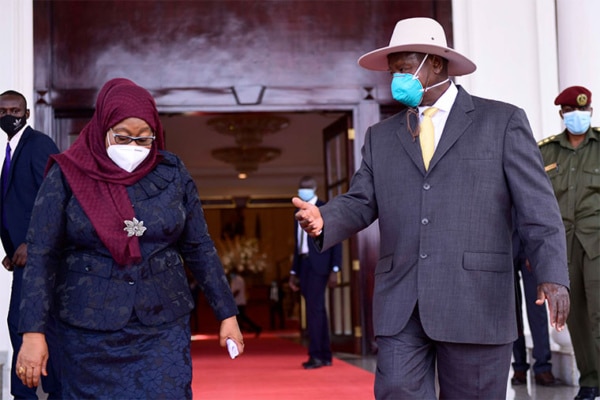President Museveni has described as a triple victory, the signing of the East African Oil Pipeline deal by Uganda, Tanzania and the oil companies.
The Tariff and Transportation Agreement (TTA), Host Government Agreement (HGA) and Shareholding Agreement (SHA) were on Sunday afternoon signed by the Uganda National Oil Company (UNOC)on behalf of the Ugandan government, the Tanzania Petroleum Development Corporation (TPDC), Total E&P, and CNOOC at a ceremony held at State House in Entebbe.
Speaking shortly after the signing ceremony, Museveni said initially he didn’t favour the idea of pipeline and advocated for an oil refinery to be set up in Uganda but noted this later changed.
“Uganda discovered petroleum and gas in 2006. It has taken these 15 years before the first oil, on account of the divergent perceptions between us and the oil companies. Initially, I did not favour the idea of the pipeline,”Museveni said on Sunday.
The president explained that in his view, it made no sense to export oil yet East Africans need it to satisfy the demand for refined products for Uganda, North-Western Tanzania, Western Kenya, Rwanda, Burundi, Eastern Congo, South Sudan and South-Western Ethiopia, with cheaper products on account of the lower transport costs.
According to Museveni, the oil companies wanted all the crude oil to be exported, adding that it was at this point that it was agreed let Uganda have both the pipeline and the refinery.
“This pipeline project can be a core of bigger developments if the brothers in Congo-Kinshasa and South Sudan choose to also use it for their oil. At the maximum, it can carry 230,000 barrels per day. Besides, the same corridor can take a return gas pipeline, supplying Tanzanian and Mozambiquan gas to Uganda and the Great Lakes’ region,” Museveni said.
Triple victory
Museveni explained that whereas the pipeline will transport Uganda’s crude oil to Tanzania, other East African countries can still use it for the same purpose of transporting their crude oil.
According to the president, there is still chance for more oil and gas to be found in the remaining oil province in the Albertine region and in the North East part of the country and this can still go through the pipeline.
“If the brother countries work together, there is, then, the oil in Congo and South Sudan. This pipeline could turn out to be a very important project that may serve the region, not only in the short term but also in the medium, if not in the long-term,” he said.
“This project should, in addition to what we have said, serve to awaken all Africans that prosperity and strategic security, are only possible if we use the Pan-Africanist approach that gives us a bigger market and rationalizes economic linkages.”
Tanzanian President, Samia Suluhu Hassan said signing the agreements is an auspicious occasion not for only Tanzania and Uganda but also East Africa at large.
“It will stimulate trade and cooperation between our brotherly countries. It’s my firm belief that the project will be of benefit to the East African Community,” Suluhu said.
“Once completed, the East African crude oil pipeline from Hoima (Uganda) to Tanga (Tanzania) will be the longest heated pipeline in the world. More than 10, 000 job opportunities will be created during execution.”
Pipeline
The East African Crude Oil Pipeline is a 1,445-kilometer-long pipeline from the oil wells in western Uganda in Hoima district to Tanzania’s seaport of Tanga.
The pipeline will cover 296km in Uganda passing through Hoima, Kyankwanzi, Mubende, Gomba, Kyotera, Lwengo, Ssembabule, Rakai, and Kikuube and 1443km in Tanzania through the regions of Kagera, Gieta, Shinyanga, Tabora, Singida, Dodoma, Manyara, and Tanga.
The $3.5 billion oil pipeline project is the longest electrically heated pipeline in the world and it is heated because Uganda’s oil is waxy.
Uganda has about 1.7 billion barrels of recoverable oil discovered in the Albertine Graben on the border between Uganda and DR Congo at the Kingfisher and Tilenga fields.
Shareholders in the East African Oil Pipeline(EACOP) include the Uganda National Oil Company (UNOC)on behalf of the Ugandan government, the Tanzania Petroleum Development Corporation (TPDC), Total E&P, and CNOOC.
With French company French Total E&P owning a majority stake of 72% in the pipeline, Uganda has 15% whereas CNOOC has 8% and Tanzania has 5%.
This post “Signing oil pipeline deal is a triple victory for us” first appeared on NilePost website.
If you would like your article/opinion to be published on Uganda’s most authoritative news platform, send your submission on: [email protected]. You can also follow DailyExpress on WhatsApp and on Twitter (X) for realtime updates.



